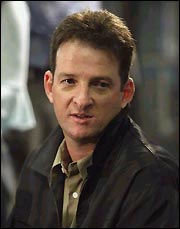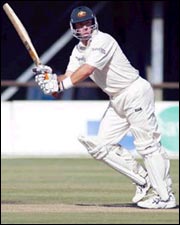Junior Waugh bows out
Daniel Laidlaw
Eight months after he was dropped from the one-day team, veteran Australian
batsman Mark Waugh was on Monday axed from Australia's first Test team
against England, prompting the end of his international career.
Waugh had come under increasing media pressure to retain his spot after
diminishing returns in the past few years, particularly since the beginning
of last season. It was generally believed Waugh needed a productive series
against Pakistan to secure his short-term future. But while brother Steve
threw off the pressure on him by dramatically reaching 100 in the third Test
in Sharjah last week, Mark made scores of 55, 0, 2 and 23 to finish with a
series average of 20.
 With his team-mates publicly supporting him and arguing for Australia's
winning side to be retained, it appeared as though Waugh might still start
the Ashes series against England, against whom he averages 50.09. But it was
not to be. Having been replaced in the side by 32-year-old South Australian
left-hander Darren Lehmann, the 37-year-old Waugh on Monday announced his
retirement from international cricket.
With his team-mates publicly supporting him and arguing for Australia's
winning side to be retained, it appeared as though Waugh might still start
the Ashes series against England, against whom he averages 50.09. But it was
not to be. Having been replaced in the side by 32-year-old South Australian
left-hander Darren Lehmann, the 37-year-old Waugh on Monday announced his
retirement from international cricket.
Waugh, who some maintain had more natural talent than brother Steve, played
128 Tests, scoring 8029 runs with 20 hundreds and finishing with an average
of 41.81. While his skills had not appreciably deteriorated in recent times,
the consistency required to maintain a place in Australia's high-performing
team had declined. His lack of form unable to continue to justify a place,
and with age and a desire to stagger the departures of he and Steve possibly
a factor, the selectors decided against giving him another series to regain
form.
Since the end of the 2001 Ashes series, Waugh could manage only 518 runs at
30.47 over 12 Tests, with no hundreds.
With the Australian selectors likely wanting to avoid introducing successors
to the two middle-order stalwarts at the same time, and with the future of
Steve Waugh beyond the current season not totally assured, the selectors
made the difficult decision to end the career of the "Junior" Waugh. Though
Steve had actually performed worse over the same period up until the last
Test against Pakistan, his leadership and more importantly the fact it was
his first form slump in recent memory meant it was not he who was under most
pressure to retain his place. However long Steve Waugh - who still has
designs on winning back a one-day place at the World Cup - continues, the
departure of Mark means the potentially destabilising prospect of replacing
the Waughs together or in quick succession, along with a captaincy change,
has been averted.
 At his press conference, Waugh said as well as giving 100 per cent for his country
he would like to be remembered as an entertainer, and he certainly was that.
A fixture at No. 4 in Australia's Test team, Mark Waugh frequently
represented a picture of poise and relaxed class, the languid and
perfectly-timed flick off the pads to anything approaching the leg side of
straight his signature shot. If he was less consistent than his talent
perhaps justified and occasionally gave his wicket away when in a position
to dominate, it was typically made up for by a superlative hundred or
match-winning innings at some stage.
At his press conference, Waugh said as well as giving 100 per cent for his country
he would like to be remembered as an entertainer, and he certainly was that.
A fixture at No. 4 in Australia's Test team, Mark Waugh frequently
represented a picture of poise and relaxed class, the languid and
perfectly-timed flick off the pads to anything approaching the leg side of
straight his signature shot. If he was less consistent than his talent
perhaps justified and occasionally gave his wicket away when in a position
to dominate, it was typically made up for by a superlative hundred or
match-winning innings at some stage.
Waugh's most memorable feats included his hundred on Test debut against
England in 1991, ironically replacing his brother; the 231-run partnership
he shared with Steve in the final Test against West Indies in Australia's
historic series victory in the Caribbean in 1995; the match-winning hundred
to beat South Africa in Port Elizabeth in 1997; and the hundred he made to
draw a Test against the Proteas in Adelaide in '98 to ensure Australia's
series victory.
Just as impressively, Waugh was also one of the best fielders of his
generation, a brilliant catcher at second slip throughout his career and
latterly at first slip to the leg-spin of Warne. Making the most difficult
catches appear simple with ridiculous nonchalance, Waugh holds the record
for most catches with 181, how many of those directly influencing the result
of matches impossible to say.
In one-day cricket, for a significant part of his career Waugh was Australia
's key batsman, his naturally free-scoring style making him ideally suited
to opening the batting when he was promoted from the middle order in 1995/'
96. He was part of Australia's World Cup-winning team in 1999 and continued
to open until poor form eventually cost him his place along with Steve
earlier this year.
 As much as Waugh will be remembered for his role in Australia's success, he
will also be remembered for his part in the match-fixing and bookmaker
scandal that cast a dark shadow over cricket in recent years. In 1998, Waugh
along with Shane Warne was revealed to have been fined by the ACB four years
previously for accepting money from an Indian bookmaker to provide pitch and
weather information in a series of phone calls in 1994/'95. Waugh's role in
the affair and the leniency of his punishment divided opinions, and only
increased his suspicion of the media.
As much as Waugh will be remembered for his role in Australia's success, he
will also be remembered for his part in the match-fixing and bookmaker
scandal that cast a dark shadow over cricket in recent years. In 1998, Waugh
along with Shane Warne was revealed to have been fined by the ACB four years
previously for accepting money from an Indian bookmaker to provide pitch and
weather information in a series of phone calls in 1994/'95. Waugh's role in
the affair and the leniency of his punishment divided opinions, and only
increased his suspicion of the media.
With international cricket now a lucrative career, it is an unfortunate fact
of life that players are increasingly unlikely to retire on their terms.
While some form of home farewell would have been the romantic ideal for one
of Australia's greats of the 1990s, Waugh had previously maintained that he
would be happy to continue until the selectors decided his time was up. On
Monday, they made that decision, bringing to a poignant end the career of
one of Australia's and the game's most attractive and enduring batsmen of
recent times.
Also read:
Mark Waugh quits international cricket
Marked Out! - a photo feature
More Columns
Mail Daniel Laidlaw